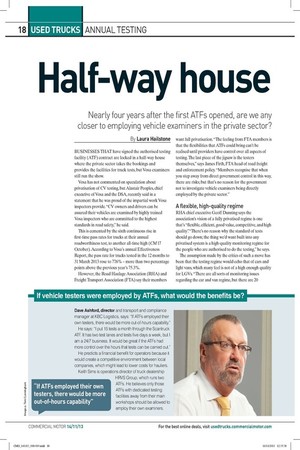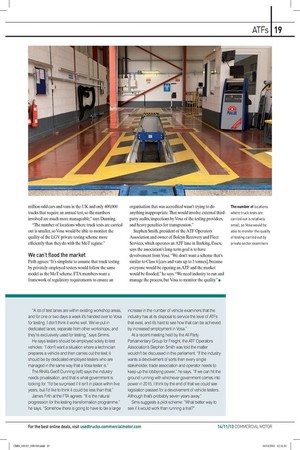If vehicle testers were employed by ATFs, what would the benefits be?
Page 14

Page 15

If you've noticed an error in this article please click here to report it so we can fix it.
Dave Ashford, director and transport and compliance manager at KBC Logistics, says: "If ATFs employed their own testers, there would be more out-of-hours capability."
He says: "I put 15 tests a month through the Scantruck ATE It has two test lanes and tests five days a week, but I am a 24/7 business. It would be great if the ATFs had more control over the hours that tests can be carried out."
He predicts a financial benefit for operators because it would create a competitive environment between local companies, which might lead to lower costs for hauliers. Keith Sims is operations director of truck dealership
HRVS Group, which runs two ATFs. He believes only those ATFs with dedicated testing facilities away from their main workshops should be allowed to employ their own examiners.
"A lot of test lanes are within existing workshop areas, and for one or two days a week it's handed over to Vosa for testing. I don't think it works well. We've put in dedicated lanes, separate from other workshops, and they're exclusively used for testing," says Simms.
He says testers should be employed solely to test vehicles: "I don't want a situation where a technician prepares a vehicle and then carries out the test; it should be by dedicated employed testers who are managed in the same way that a Vosa tester is."
The RHA's Geoff Dunning (left) says the industry needs privatisation, and that is what government is looking for. "I'd be surprised if it isn't in place within five years, but I'd like to think it could be less than that." James Firth at the FTA agrees. "It is the natural progression for the testing transformation programme," he says. "Somehow there is going to have to be a large
increase in the number of vehicle examiners that the industry has at its disposal to service the level of ATFs that exist, and it's hard to see how that can be achieved by increased employment in Vosa."
At a recent meeting held by the All Party Parliamentary Group for Freight, the ATF Operators Association's Stephen Smith was told the matter wouldn't be discussed in this parliament. "If the industry wants a devolvement of sorts then every single stakeholder, trade association and operator needs to keep up the lobbying power," he says. "If we can hit the ground running with whichever government comes into power in 2015, I think by the end of that we could see legislation passed for a devolvement of vehicle testers. Although that's probably seven years away."
Sims suggests a pilot scheme: "What better way to see if it would work than running a trial?"








































